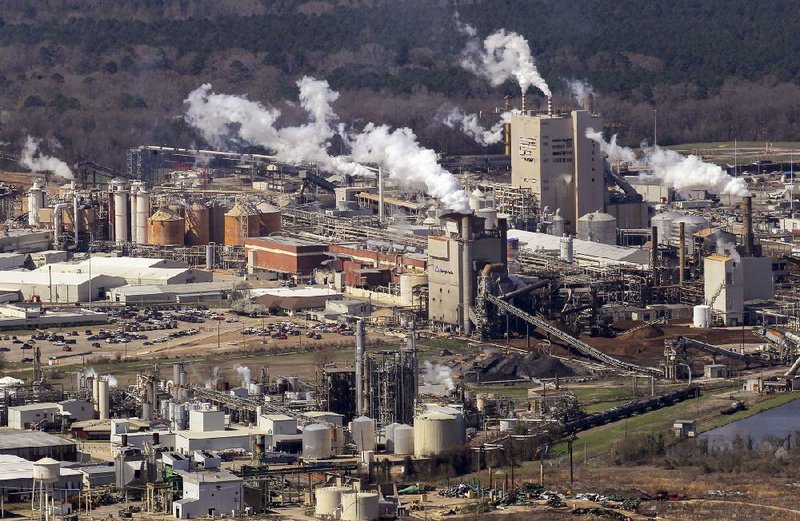Arkansas environmental regulators are taking steps to repeal one of two emission policies federal officials claimed the state failed to address in a timely manner and environmentalists have worried could harm residents living near industrial facilities.
The Arkansas Pollution Control and Ecology Commission on Jan. 28 approved proposed changes to state regulations, including the repeal of a policy granting emission exemptions under certain conditions for facilities in Pulaski County. The regulation allows facilities in the county to emit excess amounts of volatile organic compounds when malfunctioning.
Volatile organic compounds refer to thousands of chemicals that can react to form smog, according to the federal Environmental Protection Agency.
Before the repeal takes effect, it must be approved by the Arkansas Legislative Council. Once the amendments are active, the state Division of Environmental Quality will submit its revised regulations to the EPA for approval, according to Donnally Davis, chief of communications with the state Department of Energy and Environment.
Officials are still evaluating a second provision that provides "affirmative defense" for facilities that release excess emissions during emergency conditions. Deciding how to address this provision is complicated by the uncertainty of ongoing litigation surrounding federal action, Davis said in a statement.
The push to change the policies came after the EPA last month announced Arkansas was among 12 jurisdictions that failed to submit timely revisions for regulations concerning excess emissions during periods of startup, shutdown and malfunction at facilities.
Since facilities can release high levels of pollutants when starting up, shutting down or malfunctioning, regulating emissions during these periods is critical, according to Andrea Issod, senior attorney with Sierra Club's Environmental Law Program.
"We are concerned with children, the elders who are especially sensitive to pollution," Issod said. "These communities usually have the cumulative impacts of many industrial facilities already. They usually don't have the best access to health care."
Many residents living in industrial areas tend to be low-income people of color, Issod noted.
The Sierra Club helped initiate the push to revise state regulations in 2011 by petitioning the EPA to address startup, shutdown and malfunction emissions.
Provisions that provide facilities with "affirmative defense" -- like the emergency condition provision Arkansas regulators are currently reviewing -- can be especially detrimental since they can prevent regulators from holding emitters accountable. Facilities operating under these conditions can be exempt from enforcement penalties if they can prove they met criteria, according to Patton Dycus, senior attorney at the Environmental Integrity Project.
Were the permittees of an Arkansas facility to claim affirmative defense for excess emissions that occurred during an emergency, the operators would have to identify the cause or causes of the emergency to regulators. The permittees would also need to show they were operating the facility properly, that they took all reasonable steps to reduce excess emissions during the emergency and that they submitted notice of the upset to the state Division of Environmental Quality by the end of the business day following the emergency, according to state regulations.
A review of state air quality permits by the Arkansas Democrat-Gazette showed that at least 13 active permits cite the affirmative defense emergency provision. Most of these references regard the operation of emergency generators or booster pumps.
• AluChem of Little Rock LLC in Little Rock
• Arauco North America Inc. in Malvern
• Lb AmFuel, LLC in Magnolia
• Roseburg Forest Products Co. in El Dorado
• White Rock Oil & Gas LLC in Magnolia
• Tyson Poultry Inc. in Pine Bluff
• Anthony Timberlands in Malvern
• U.S. Vanadium, LLC in Hot Springs
• Georgia-Pacific Wood Products LLC in Gurdon
• Kimberly-Clark Corp. in Maumelle
• Arkansas Electric Cooperative Corporation -- Magnet Cove Generating Station in Malvern
• Great Lakes Chemical Corporation-South Plant
• Riceland Foods Inc.-Soy Division in Stuttgart
The Division of Environmental Quality is unaware of any situation in which a party has asserted affirmative defense for emissions during emergency conditions, according to a statement.
Federal officials originally called on 45 jurisdictions to bring regulations in line with the federal Clean Air Act by revising emissions rules during startup, shutdown and malfunction in 2015.
If the remaining 12 states and local districts fail to revise their plans within 24 months from the time of the latest announcement, the EPA would create federal plans for the jurisdictions. The agency would also impose federal sanctions if the jurisdictions missed certain deadlines within the two-year period, according to the agency.
The delay between the call for revisions and the EPA's current action is due primarily to transitions between presidential administrations. The agency issued its original request under former President Barack Obama. After Donald Trump was elected, the agency relaxed its pressure on states. Late last year, President Joe Biden's EPA returned to its 2015 stance.
Arkansas, along with five other states, has mounted a legal challenge to the EPA rule. In a statement, state Attorney General Leslie Rutledge favored Trump administration standards, which she said would "allow energy providers to adequately meet energy needs at affordable prices."
"The standards that Biden's EPA is once again trying to impose will force states like Arkansas to impose unnecessary and wasteful burdens on economic activity, which will in turn undermine our growth and ability to meet mounting demand for energy, infrastructure, and related services," she said in the statement.
Opposing the EPA's recent action is important for restoring autonomy and decision-making power to local and state leadership, Rutledge said.
The case is scheduled for oral arguments in front of the U.S. Court of Appeals for the District of Columbia in March, according to Dycus.
